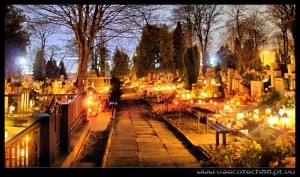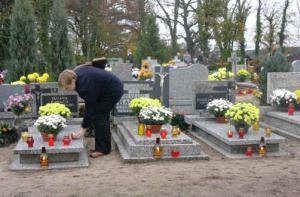 November 1, All Saints Day (Wszystkich Świętych), is celebrated throughout Poland as a way to honor those relatives who have died. It remains an important holiday in Poland, surpassing Christmas as THE time to get together as a family. All Souls Day (Dzien Zaduszny or Zaduszki), November 2, is the busiest travel day of the year in Poland as family members head home. The evening between the two days is a traditional time to bring all family members together, attend church and remember past family members.
November 1, All Saints Day (Wszystkich Świętych), is celebrated throughout Poland as a way to honor those relatives who have died. It remains an important holiday in Poland, surpassing Christmas as THE time to get together as a family. All Souls Day (Dzien Zaduszny or Zaduszki), November 2, is the busiest travel day of the year in Poland as family members head home. The evening between the two days is a traditional time to bring all family members together, attend church and remember past family members.
Cemeteries glow in the light of thousands of special, long-burning candles, many in colorful glass jars. The candles light the way for departed souls to come back and find their families. Graves and gravestones are scrubbed and adorned with flowers including many chrysanthemums. Roads are packed with cars as relatives travel long distances to family cemeteries across Poland. Graves without family members are also scrubbed in the spirit of honoring all departed souls.
 In Poland All Saints Day is a national holiday. Everyone has the day off except emergency service personnel and transportation employees. Catholics believe the day is a prayerful communion with those who have died and are in heaven. All Soul’s Day is when families honor those who are not yet purified but are honored. Poland remains a deeply faithful country with ninety-five percent of the population Catholic. However, I did see one post that the holiday continued to be celebrated under communism as the Day of the Deceased.
In Poland All Saints Day is a national holiday. Everyone has the day off except emergency service personnel and transportation employees. Catholics believe the day is a prayerful communion with those who have died and are in heaven. All Soul’s Day is when families honor those who are not yet purified but are honored. Poland remains a deeply faithful country with ninety-five percent of the population Catholic. However, I did see one post that the holiday continued to be celebrated under communism as the Day of the Deceased.
I live in Arizona where there are many Latinos, most with a strong Catholic faith. Here November 1 is known as Day of the Dead. I’m told it’s a happy day for families to gather at cemeteries, and even have picnics as they join their extended family in heaven. An altar or ofrenda tells the story of someone’s life through assembled objects, often someone very special who has died. In Mexico All Saints Day is also a national holiday. A friend at work who grew up in Mexico City described the identical practice as in Poland – gather the generations together, clean the graves, decorate them with flowers and light many candles. She also described it as prayerful, and a time of reflection.
I have not experienced a Polish All Saints Day before, and it would be impossible to celebrate the day within my family. Like more and more Americans, both my parents and my brother chose to be cremated, their ashes scattered in special places. The few relatives I have are several states away in Washington State. I have no grave stones or cemetery to visit or clean to honor my family. I can only wonder and watch the special day from a distance, with a small touch of sentimental envy.
I don’t claim an expertise in any way, but hope to share with other readers the importance of the day in Polish culture, and an idea of what it might look like should you visit Poland. Information has been compiled from several web sites, including Catholic.org.

3 Comments. Leave new
And for the pagans, this “Samhain” is their version of the New Year’s celebration. So, whether All Saints or New Years, seems today is a FINE day to celebrate!
Interesting!
Growing up as an East Coast Catholic, All Souls Day and All Saints Day were very special days. Thanks for the reminder.
Would love to get email updates. Thanks!